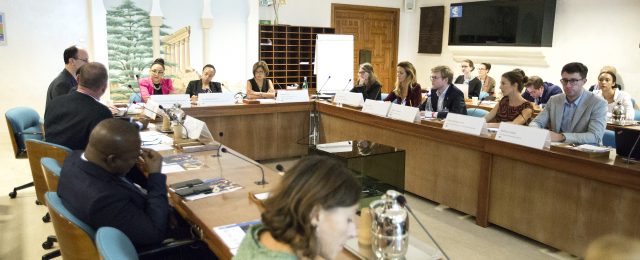How could improved nutrition contribute to a food system transformation?

On 15 October the World Benchmarking Alliance (WBA), World Food Programme (WFP) and International Fund for Agricultural Development (IFAD) jointly held a side event at the 46th Food and Agriculture (FAO) Committee on World Food Security (CFS) in Rome. The event bought together speakers from both the public and private sectors to discuss their respective contributions to food system transformation, with a specific focus on improved nutrition.
Identifying bottlenecks and opportunities leads to tailored action
WBA presented our ongoing work in developing a Food and Agriculture Benchmark, which aims to create a tipping point in global food systems, and provide a roadmap for SME’s alongside MNE’s; WFP presented results from their Fill the Nutrient gap in Lesotho, identifying bottlenecks and opportunities for systems to improve availability, access, affordability and choice of nutritious foods; and IFAD indicated how these findings have been integrated into their country strategic plan for Lesotho, prioritising investments and addressed through tailored programs.
We were also delighted to invite two speakers to the event; Rogers Mugambi, Chief Business Officer at East African Seed, the top performing company in the 2019 Access to Seeds Index for Eastern & Southern Africa; and Carl Reynolds, CEO of KudosAfrica, a sustainability rating and services provider focused on African businesses. Further public sector perspective was provided by Lineo Irene Molise-Mabusela, the ambassador of the Kingdom of Lesotho in Italy, and Fatiha Terki, the deputy director in the nutrition division of WFP.
Shared understanding, affordability and collaboration are crucial
At the panel discussion, moderated by Sara Mbago-Bhunu, Regional Director for East and Southern Africa at IFAD, the following key takeaways were concluded:
- Importance of shared understanding and direction between public and private sectors is crucial for achieving food system transformation.
- Affordability of nutritious foods is a key aspect for consumers as well as small-scale producers; there needs to be a true business case for producing diverse and nutritious crops and one which is a profitable and viable proposition for smallholder farmers. This finding complements the conclusions of the Access to Seeds Index, which in 2019 demonstrated that companies with an explicit focus on smallholder farmers, such as East-West Seed and East African Seed, can lead the way in serving this vital group of farmers while simultaneously being successful business enterprises.
- Multi-stakeholder collaboration is vital; nutrition is a topic to be addressed jointly, with no individual sector or actor alone capable of driving the holistic change required across the entire food system and value chain. The opportunities to align objectives of local governments and the private sector are huge.
We thank FAO and our fellow hosts WFP and IFAD for the opportunity to hold the side event, while the outcomes of the conversation will provide valuable input into the ongoing methodology development of the WBA Food and Agriculture benchmark and the third version of the Access to Seeds Index.
©FAO/Pier Paolo Cito